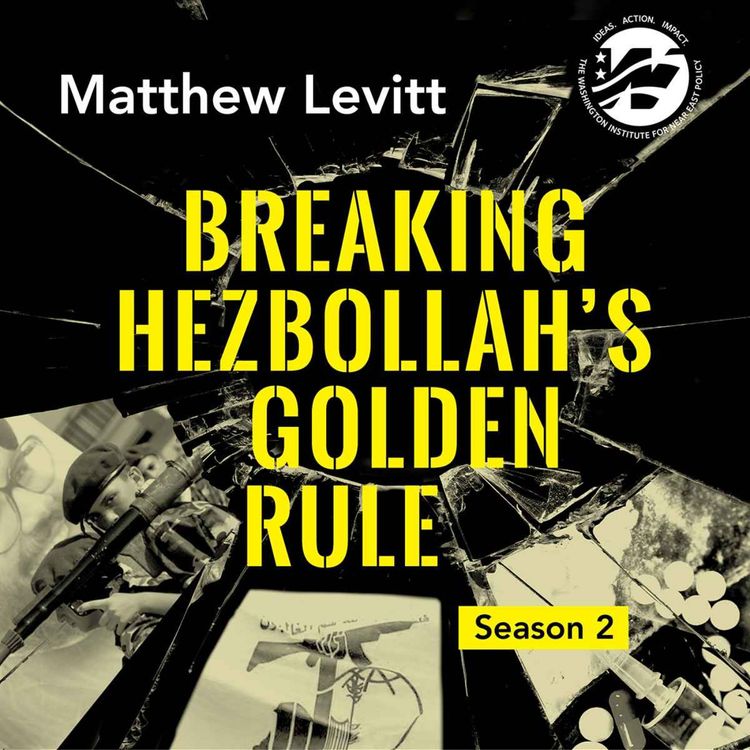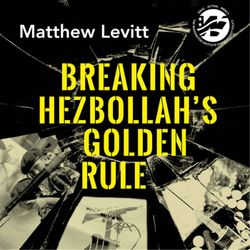Share

Breaking Hezbollah's Golden Rule
Hezbollah’s Digital Footprint
40 years ago this week, Hezbollah blew up the barracks of U.S. Marine and French military peacekeepers in Beirut, killing about 300 people. The group continues to carry out attacks, but has developed the means to complement and support these real-life operations through online activities. Hezbollah was one of the first non-state actors to build up a digital presence to conduct cyber operations against its enemies. The group also uses some unconventional means to recruit and radicalize followers and engages in cyber attacks and sleuthing targeting its enemies. Today, Hezbollah even produces its own first-person shooter video games in which gamers kill Israeli soldiers to promote its vision of the world to impressionable youth. This week, we shine our spotlight on Hezbollah’s digital footprint.
Guests:
- Galen Lamphere-Englund, co-founder, Extremism and Gaming Research Network.
- Alma Keshavarz, official, U.S. Cyber Command.
- Douglas London, former official, Clandestine Service, CIA.
Breaking Hezbollah’s Golden Rule is hosted by Dr. Matthew Levitt from the Washington Institute for Near East Policy.
It is produced by Anouk Millet from Earshot Strategies, and written by Dr. Levitt, Lauren von Thaden, and Camille Jablonski, research assistants at The Washington Institute.
Explore my map and timeline of Hezbollah’s Worldwide activities.
For a full transcript of the episode, a list of sources, recommended reading, and information on our guests, visit our website.
More episodes
View all episodes

Breaking Hezbollah's Golden Rule - Trailer
02:17||Season 1, Ep. 0Preview Breaking Hezbollah's Golden Rule, a podcast series devoted to shining a bright light on the global terrorist and criminal activities that the Lebanese organization would rather remain in the shadows. Coming soon to your favorite podcatcher.
1. Origin Story—"Wild, Wild West Beirut"
30:05||Season 1, Ep. 1On his first day with the State Department, Special Agent Fred Burton found a suicide bomber’s ear in a file on his desk. The bomber had targeted the U.S. embassy in Beirut on behalf of a shadowy new group called Hezbollah. Soon, the group was carrying out even bigger attacks and kidnapping journalists and innocent civilians for ransom. Reporting on these events, a CIA report from the time referred to the area as "Wild, Wild West Beirut." Where did this group come from? Where did it get funding and support? And where would it strike next?Guests: Fred Burton, former police officer, special agent, and New York Times bestselling author.Magnus Ranstorp, strategic advisor at the Centre for Societal Security and the EU Radicalisation Awareness Network. Breaking Hezbollah’s Golden Rule is hosted Dr. Matthew Levitt from the Washington Institute for Near East Policy. It is produced by Anouk Millet from Earshot Strategies, and written by Dr. Levitt and Lauren Fredericks, a Washington Institute research assistant. Explore my map and timeline of Hezbollah’s Worldwide activities. For a full transcript of the episode, a list of sources, recommended reading, and information on our guests, visit our website.
2. Hezbollah Goes Global
30:30||Season 1, Ep. 2In December 1983, six blasts shook Kuwait’s capital city. Two prominent Hezbollah operatives oversaw the attack. Soon, bombs were going off in Paris, Copenhagen, and Saudi Arabia, while other members of the group hijacked TWA Flight 847 and murdered U.S. Navy diver Robert Stethem. What did Hezbollah want? And why was a Lebanese-based militant group conducting attacks in Europe and the Gulf?Guests:Nader Uskowi, former journalist and author of Temperature Rising: Iran’s Revolutionary Guards and Wars in the Middle EastDr. Hans-Jakob Schindler, senior director at the Counter Extremism ProjectHans-Georg Engelke, State Secretary at the German Federal Ministry of the Interior and CommunityBreaking Hezbollah’s Golden Rule is hosted Dr. Matthew Levitt from the Washington Institute for Near East Policy. It is produced by Anouk Millet from Earshot Strategies, and written by Dr. Levitt and Lauren Fredericks, a Washington Institute research assistant. Explore my map and timeline of Hezbollah’s Worldwide activities. For a full transcript of the episode, a list of sources, recommended reading, and information on our guests, visit our website.
3. Crime and Terror in South America
35:50||Season 1, Ep. 3South America’s Tri-Border Area has been described as “the United Nations of crime.” Along the porous borders of Argentina, Paraguay, and Brazil, counterfeiters scheme, narco-traffickers move product and launder funds, and criminals sell fake or stolen goods on the open market. Since the 1980s, the area has also been a hotbed of Hezbollah criminal and terrorist activities. Nobody seemed to notice—until Hezbollah operatives carried out two bombings in under two years in Buenos Aires.Guests: Christian Vianna de Azevedo, special agent with the Brazilian Federal Police Mariano Federici, former head of Argentina’s Financial Intelligence Unit Robert Clifford, former FBI special agent Breaking Hezbollah’s Golden Rule is hosted Dr. Matthew Levitt from the Washington Institute for Near East Policy. It is produced by Anouk Millet from Earshot Strategies, and written by Dr. Levitt and Lauren Fredericks, a Washington Institute research assistant. Explore my map and timeline of Hezbollah’s Worldwide activities. For a full transcript of the episode, a list of sources, recommended reading, and information on our guests, visit our website.
4. Hezbollah Support Networks in America
36:05||Season 1, Ep. 4In Charlotte, North Carolina, a gang of Hezbollah criminals smuggled cigarettes across state lines to raise funds. But on Thursday nights, they gathered and watched Hezbollah martyrdom videos. When the FBI began to surveil the group, agents saw the men conducting firearms training and feared they could “go operational” at any time. The ensuing investigation, dubbed Operation Smokescreen, exposed the inner workings of a Hezbollah network in the American heartland. Guests: Robert Clifford, former FBI special agent Frederick Fife, former FBI special agent and current major in the New Jersey State Police Breaking Hezbollah’s Golden Rule is hosted Dr. Matthew Levitt from the Washington Institute for Near East Policy. It is produced by Anouk Millet from Earshot Strategies, and written by Dr. Levitt and Lauren Fredericks, a Washington Institute research assistant. Explore my map and timeline of Hezbollah’s Worldwide activities. For a full transcript of the episode, a list of sources, recommended reading, and information on our guests, visit our website.
5. Hezbollah Attack Plots in Cyprus and Bulgaria
38:20||Season 1, Ep. 5In July 2012, police arrested a well-trained Hezbollah operative named Hossam Yaacoub in Cyprus. Less than two weeks later, a Hezbollah suicide bomb killed 5 Israelis on a tourist bus in Burgas, Bulgaria. But the group wasn’t done in Cyprus. Another operative was stockpiling explosives—and waiting to act.Guests: Magnus Norell, senior policy advisor at The European Foundation for Democracy Carter Burwell, former counselor to the Secretary of the Treasury for Terrorism and Finance IntelligenceNickolay Mladenov, former Bulgarian minister of foreign affairs Breaking Hezbollah’s Golden Rule is hosted Dr. Matthew Levitt from the Washington Institute for Near East Policy. It is produced by Anouk Millet from Earshot Strategies, and written by Dr. Levitt and Lauren Fredericks, a Washington Institute research assistant. Explore my map and timeline of Hezbollah’s Worldwide activities. For a full transcript of the episode, a list of sources, recommended reading, and information on our guests, visit our website.
6. Operation Cedar: Hezbollah Narco-Money Laundering
35:32||Season 1, Ep. 6European authorities weren’t looking for Hezbollah when they investigated a massive money laundering network operating across at least seven EU countries. But when they reached out to their close partners at the U.S. Drug Enforcement Administration, the DEA came back with startling information: the gang included high-ranking Hezbollah operatives and sent its profits back to Lebanon to fund Hezbollah terrorist activities. Why would Hezbollah risk drawing additional attention from law enforcement?Guests: Quentin Mugg, French case officer for Operation CedarBenedikt Strunz, investigative reporter with Norddeutscher RundfunkJohn Fernandez, former DEA Assistant Special Agent in Charge Breaking Hezbollah’s Golden Rule is hosted Dr. Matthew Levitt from the Washington Institute for Near East Policy. It is produced by Anouk Millet from Earshot Strategies, and written by Dr. Levitt and Lauren Fredericks, a Washington Institute research assistant. Explore my map and timeline of Hezbollah’s Worldwide activities. For a full transcript of the episode, a list of sources, recommended reading, and information on our guests, visit our website.
7. Hezbollah “Black Ops” in the Western Hemisphere
32:46||Season 1, Ep. 7On June 1, 2017, U.S. authorities arrested two Hezbollah sleeper agents. The operatives had created targeting packages with ready-to go-plans for possible attacks, in the event Iranian or Hezbollah leaders deemed them necessary. They traveled on their American passports when Hezbollah sent them on missions in Asia and South America. Where were their targets? Who was their handler? And what were they sent to do abroad?Guests: Mitchell Silber, former director of intelligence analysis, NYPDRebecca Weiner, assistant commissioner for intelligence analysis, NYPDEmil Bove, former co-chief for national security, U.S. Attorney’s Office for the Southern District of New YorkAmbassador Nathan Sales, former ambassador-at-large and coordinator for counterterrorism, State Department Breaking Hezbollah’s Golden Rule is hosted Dr. Matthew Levitt from the Washington Institute for Near East Policy. It is produced by Anouk Millet from Earshot Strategies, and written by Dr. Levitt and Lauren Fredericks, a Washington Institute research assistant. Explore my map and timeline of Hezbollah’s Worldwide activities. For a full transcript of the episode, a list of sources, recommended reading, and information on our guests, visit our website.
8. Undermining Stability in Lebanon
42:01||Season 1, Ep. 8Hezbollah’s deep penetration of the Lebanese financial system threatens the legitimacy and stability of the state it claims to protect. After all, when the group engages in money laundering and narcotics trafficking around the world, where does the dirty money go? Back home to Lebanon. And critics beware—vocal opposition to Hezbollah’s activities can be fatal. Even for a former prime minister.Guests: Daniel Glaser, former assistant secretary, Office of Terrorism and Financial Intelligence, Treasury DepartmentHanin Ghaddar, Friedmann Fellow at The Washington InstituteNathan Sales, former ambassador-at-large and coordinator for counterterrorism, State DepartmentQuentin Mugg, former French police captain Breaking Hezbollah’s Golden Rule is hosted Dr. Matthew Levitt from the Washington Institute for Near East Policy. It is produced by Anouk Millet from Earshot Strategies, and written by Dr. Levitt and Lauren Fredericks, a Washington Institute research assistant, with help from Washington Institute intern Lauren von Thaden. Explore my map and timeline of Hezbollah’s Worldwide activities. For a full transcript of the episode, a list of sources, recommended reading, and information on our guests, visit our website.